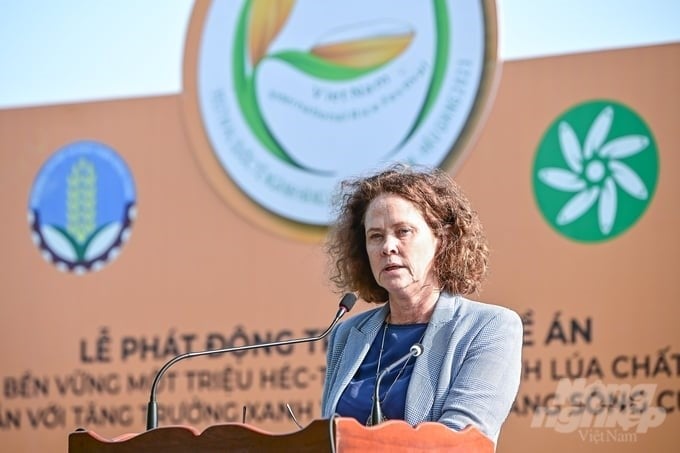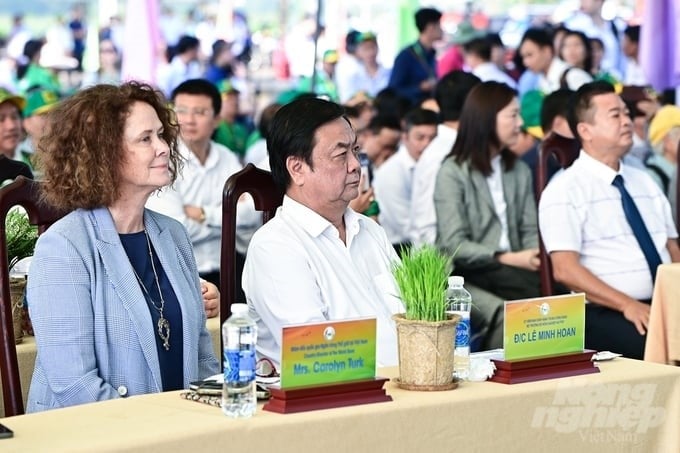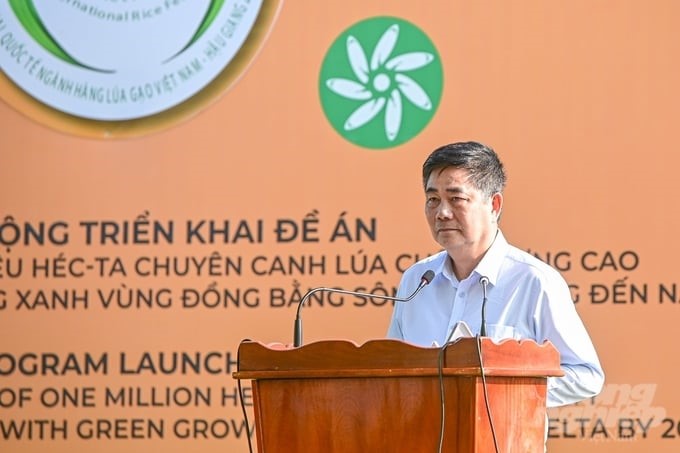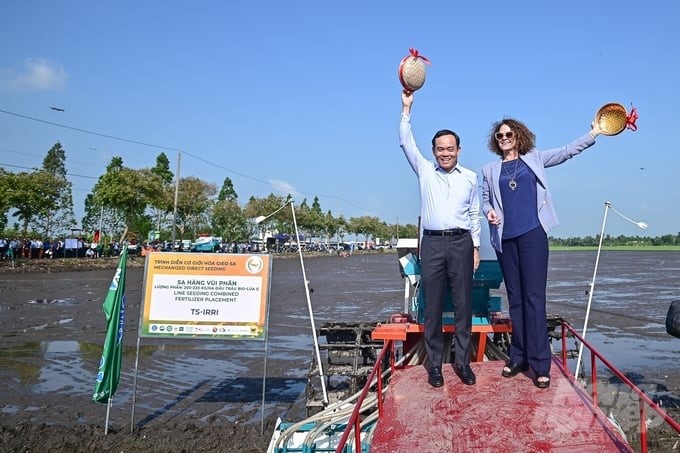May 24, 2025 | 16:19 GMT +7
May 24, 2025 | 16:19 GMT +7
Hotline: 0913.378.918
May 24, 2025 | 16:19 GMT +7
Hotline: 0913.378.918
On the morning of December 12, at the launching ceremony for implementing the Sustainable Development Project of one million hectares specializing in high-quality, low-emission rice cultivation associated with green growth in the Mekong Delta until 2030 by Minister of Agriculture and Rural Development Le Minh Hoan, international organizations committed to accompanying the Government, Ministry of Agriculture and Rural Development (MARD), and Mekong Delta provinces in implementing the project.
According to Ms. Carolyn Turk (World Bank Country Director in Vietnam), in order to promote the development of the rice industry, it is mandatory to achieve many targets. The rice industry not only brings benefits to each country’s agriculture and economy, but it also brings life and income to farmers and makes practical contributions to this planet.

Ms. Carolyn Turk (World Bank Country Director in Vietnam): "The World Bank commits to accompanying the project."
“The World Bank accompanies MARD to build a project to develop one million hectares specializing in high-quality rice. We believe that this project will effectively support farmers and Vietnam's agriculture, directly contributing to the economy as well as improving people's lives. For many years, we have accompanied Vietnam in transforming the agriculture sector. With the application of science and technology, farmers today produce better and more eco-friendly products.
With the VnSAT Project covering over 180,000 hectares, Vietnam has achieved significant emission reductions in both methane and carbon emissions in general. When production costs reduce by 25%, output also increases by 10%. This overall will result in a 30% increase in profits for farmers and better protection for the planet's environment.

Minister Le Minh Hoan at the launching ceremony for implementing the One Million Hectares of High-Quality Rice Project.
“We believe that the Government of Vietnam has gone in the right direction through the experiences that other countries in the world have gone through. The World Bank commits to accompanying and supporting the One Million Hectares Rice Project for the Mekong Delta provinces, MARD, and the Government of Vietnam. During the implementation of this project, Minister Le Minh Hoan mentioned that we will mobilize carbon finance to support the project’s implementation. I think this is the right direction. We will also support Vietnam to quickly receive emission reduction results from the VnSAT project.
We will also support Vietnam with mechanisms so that we can participate in the voluntary carbon market, thereby possibly using a sustainable financial source to continue our development and livelihood activities in the future. And we also look forward to our cooperation in implementing this project. We will jointly implement the One Million Hectares Project," the World Bank Country Director in Vietnam affirmed.
Dr. Cao Duc Phat, Chairman of the IRRI Board of Members and former Minister of Agriculture and Rural Development, shared: "IRRI warmly welcomes the Government of Vietnam for launching the Project of One Million Hectares of High-Quality, Low-Emission Rice Associated with Green Growth in the Mekong Delta Until 2030. This is the world’s first large-scale project in this direction. The project is extremely necessary, allowing us to simultaneously solve three major problems for the rice industry around the world and in Vietnam in particular. That is to increase rice production, increase income for rice farmers, and adapt and mitigate climate change."

Dr. Cao Duc Phat: "IRRI will sign a long-term cooperation memorandum."
Mr. Cao Duc Phat assessed that, in the world, rice is the main food of over 3 billion people. Rice production is the main source of employment and income for about 140 million small farmer households, using 11% of global arable land. Despite many efforts, many countries still lack rice. The world still has to make efforts to increase production. At the same time, there must be more ways to quickly increase farmers' income to encourage them to increase yield.
On the other hand, rice production is a vulnerable industry to climate change but is also a major greenhouse gas emitter, contributing about 10% of greenhouse gas emissions in agriculture, or 1.3–1.8% of global greenhouse gas emissions. In Vietnam, these rates are much higher. Therefore, it is necessary to have solutions to adapt to climate change and reduce greenhouse gas emissions soon.
The International Rice Research Institute (IRRI) has had decades of cooperation with Vietnam. IRRI is always proud to make contributions to the development of Vietnam's rice industry. During the period 1980–2009, among the 226 rice varieties grown in Vietnam, 25% were bred by IRRI, and 52% of the varieties bred by Vietnamese scientists used parent varieties originating from IRRI.

The World Bank Country Director in Vietnam and Deputy Prime Minister Tran Luu Quang were at the event.
IRRI has also coordinated with Vietnam’s scientific organizations to research and improve farming processes, improve tools for rice farming, and train officials for Vietnam. Most recently, the unit has coordinated research on rice farming processes, rice straw treatment to reduce greenhouse gas emissions, and techniques for monitoring and measuring greenhouse gas emissions from rice fields to facilitate the commercialization of rice products and carbon credits generated.
“IRRI is very grateful to the Government of Vietnam and the World Bank for choosing the Institute as the international technical consultant for this important project. The Institute will mobilize the maximum scientific force with the latest skills to participate in implementing the project. First of all, provide and coordinate the selection and creation of suitable, high-quality rice varieties; continue to improve rice farming processes to reduce greenhouse gas emissions; develop techniques for monitoring and measuring greenhouse gas emissions; propose the perfection of relevant policies; and train officials and farmers.
At this Festival, the Institute will sign with MARD a memorandum of understanding on long-term cooperation in research and transfer of science and technology in the rice field," said Chairman of the IRRI Board of Members, Dr. Cao Duc Phat.
Translated by Huyen Vu Thu

(VAN) In the tranquil wetlands of Van Long, there are quiet souls who guard the forests, nurture the waters, and oversee every bird and troop of langurs as protecting the essence of a living heritage.

(VAN) WWF, GIZ, IUCN, UNDP call for biodiversity conservation and sustainable development must be regarded as a unity in strategies for a green future.

(VAN) On celebration of International Day for Biological Diversity, Deputy Minister Nguyen Quoc Tri called for practical actions to address nature and biodiversity conservation.

(VAN) Dr. Hoang Thi Thanh Nhan – Deputy Director of the Nature and Biodiversity Conservation Agency – highlighted this on the International Day for Biological Diversity, May 22, 2025.
![Ho Chi Minh city adapts to climate change: [2] Accelerating action](https://t.ex-cdn.com/nongnghiepmoitruong.vn/608w/files/chiqk/2025/05/22/4024-4220-bien-doi-khi-hau-1-100626_766.jpg)
(VAN) Clearly recognizing the challenges posed by climate change, Ho Chi Minh city has swiftly shaped its policies and implemented practical solutions to adapt.

(VAN) Rice straw is no longer just a discarded byproduct, but it is becoming a green resource that helps farmers in the Mekong Delta reduce emissions and promote circular, sustainable agriculture.

(VAN) Other Effective Area-based Conservation Measures (OECMs) are solutions that contribute effectively to achieving the goals of the Kunming–Montreal Global Biodiversity Framework.